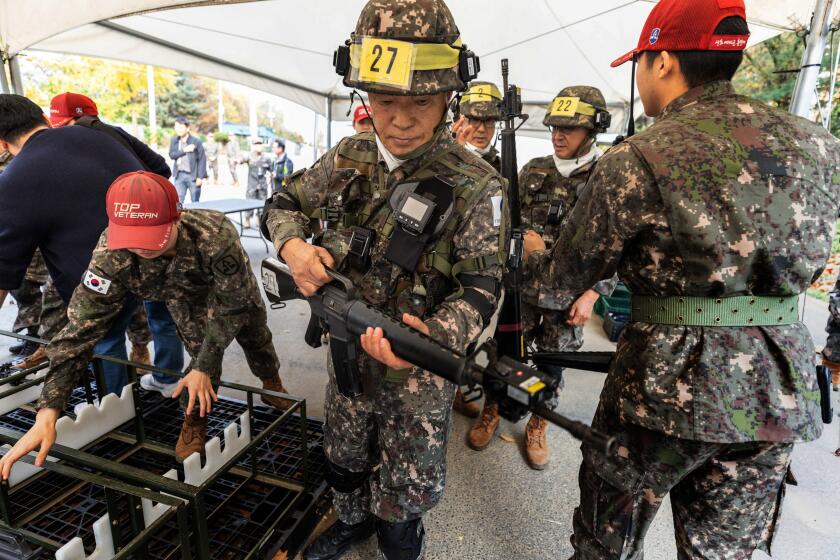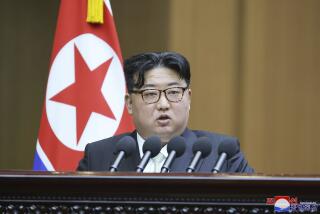Should North Korea and South Korea even bother trying to reunify?

SEOUL — It is a dream that has been sacrosanct in South Korea for seven decades: reunification with North Korea.
Which is why one politician’s comments this month were so jarring.
“Reunification? Let’s not do it,” said Im Jong-seok, who was chief of staff to President Moon Jae-in, who left office in 2022. “Let us abandon the compulsive idea that we absolutely must reunify.”
“Let us acknowledge the objective reality and accept the two separate countries,” he continued in a speech commemorating the anniversary of the historic 2018 summit between Moon and North Korean leader Kim Jong Un.
Political opponents and allies alike quickly shot back.
In a new memoir, the former South Korean president who brokered nuclear talks between Kim Jong Un and Donald Trump has kind words for both.
Conservative newspapers ran editorials suggesting that Im is legitimizing the North Korean dictator. President Yoon Suk-yeol criticized the idea as unconstitutional. Lawmakers from Im’s liberal party made it clear that the comments do not reflect its official stance, which advocates peaceful reunification.
Im later clarified that he was emphasizing the need to peacefully coexist with a hostile neighbor.
But his comments — and the blowback they caused — speak to a changing political reality in which a growing number of South Koreans are in fact asking the very same question: At this point, is reunification with North Korea possible, or even desirable?
The Korean War ended in 1953 with a cease-fire, but not a peace treaty.
“Reunification was central to the founding mission of the South Korean government,” said Kim In-han, a political scientist at Ewha Womans University in Seoul.
“The official view has always been that South Korea’s territory extends to what is currently North Korea.”
Terrible work-life balance is widely blamed for South Korea’s nose-diving fertility rate, which politicians have described as a national emergency.
It is enshrined in South Korea’s constitution, which states that the president is duty-bound to work toward peaceful reunification. A special government ministry — the Ministry of Unification — exists to oversee this mission.
“If we give up reunification, the conflict between North and South Korea will grow even more bitter and the security threat on the peninsula will only grow,” President Yoon said in response to Im’s comments.
Despite periods of hostility and military clashes with South Korea, North Korea has also long operated on the principle that the two countries, akin to temporarily estranged siblings, should one day be reunited.
“The two sides will reconnect the blood relations of the nation and bring forward the future of co-prosperity and independent reunification,” read the joint declaration issued after the summit between the countries’ leaders in 2018.
In recent years, however, the prospect has grown ever more remote.
North Korea’s Kim, for one, has officially abandoned the idea.
“The two countries no longer share any kinship. Their relationship has now completely settled into that of two hostile countries, two belligerents at war,” North Korean media reported him saying in January. “Reunification will never be possible with South Korea.”
And although Seoul’s official position remains pro-reunification, younger South Koreans are also increasingly dismissing the idea, viewing it as a costly undertaking that will simply invite in a mass of impoverished refugees who will struggle to adjust in a capitalist democracy.
With South Korea’s birthrate plummeting, veterans in their 60s and 70s say they can bolster the army’s ranks. But can they keep up with the young?
The proportion of South Koreans between the ages of 19 and 29 who believe reunification is necessary fell from 54% in 2018 to 28% last year, according to a survey by Seoul National University’s Institute for Peace and Unification Studies.
But Kim In-han, the political scientist, said he believes that many of them will change their mind when faced with the real-life implications.
“North Korea’s economy is struggling from years of sanctions because of their missile and nuclear tests, and other than a few loyal elites in Pyongyang, ordinary North Koreans are left to fend for themselves,” he said.
If the government were to collapse, whether triggered by a coup or some other internal breakdown, violence and chaos would fill the political vacuum, spilling over to South Korea’s borders. China might try to muscle in to restore order. A massive refugee crisis would need to be contained.
“Then the question becomes: Do you want to live next to a failed state ruled by gangs like Haiti, or do you want South Korea to take the initiative, steer the region toward stability and eventually democratize and reunify with the North?” said Kim, the political scientist.
“I think even most young people would choose the latter.”
More to Read
Sign up for Essential California
The most important California stories and recommendations in your inbox every morning.
You may occasionally receive promotional content from the Los Angeles Times.














